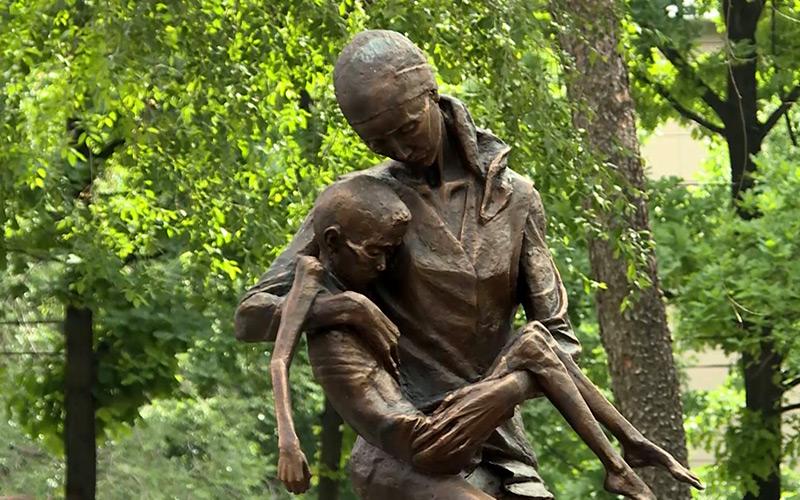A virtual discussion hosted by the Central Asia Program at the Institute for European, Russian, and Eurasian Studies at the George Washington University on June 8, 2021.
May 31 marks the Remembrance Day of the Victims of Political Repression and Famine in Kazakhstan. The great famine of 1931–1933, also known as Asharshylyk, resulted from forced collectivization and sedentarization undertaken by the Soviet regime. According to some sources, more than 1.5 million people, approximately one-third of the Kazakh population, perished. Several hundred thousand survivors fled Kazakhstan to escape the famine. President Kassym-Jomart Tokayev, in his article “Independence: A Most Precious Thing,” pointed out that the mass famine in Kazakhstan has not been comprehensively studied.
Speakers
Yerzhan Ashikbayev, Ambassador of Kazakhstan to the United States
Prior to his appointment as the Ambassador to the United States, Mr. Yerzhan Ashikbayev has served as Deputy Minister of Foreign Affairs of Kazakhstan (2013-2021). Before becoming Deputy Minister, he held the position of Deputy Head of the Prime Minister’s Office – Official Representative of the Government of Kazakhstan since 2012. In 2012-2013, Mr. Yerzhan Ashikbayev previously served as Chief of the Foreign Policy Centre of the Presidential Administration of Kazakhstan. He speaks Russian, English, Turkish and French.
Sarah Cameron, Associate Professor of History at the University of Maryland, College Park
Sarah Cameron’s research interests include genocide and crimes against humanity, environmental history, and the societies and cultures of Central Asia. She is the author of The Hungry Steppe: Famine, Violence, and the Making of Soviet Kazakhstan (Cornell University Press, 2018), which examines the causes and consequences of one of the most heinous crimes of the Stalinist regime, the Kazakh famine of 1930-33. In the United States, the book won four book awards and two honorable mentions. It also provoked intense discussion in Kazakhstan, where the famine remains a sensitive topic in part due to the country’s close relationship with Russia. Russian and Kazakh translations have been released, and the book was the top selling history title in Kazakhstan for 2020. At present, Prof. Cameron is at work on a new book-length project examining the transformation of the Aral Sea in Central Asia over the course of the twentieth century.
Peter Rollberg, Associate Dean for Faculty Affairs and Research Initiatives, Elliott School of International Affairs, GWU
Dr. Rollberg earned his Ph.D. in 1988 at the University of Leipzig, Germany. His main field of expertise is Russian literature and film. His publications include articles in Russian, English, and German on Bogdanov, Bulgakov, Nabokov, Grossman, Makanin, Kim, and Russian cinema, as well as translations of Russian literature. He recently released The Cinema of Soviet Kazakhstan 1925–1991: An Uneasy Legacy (Lexington, 2021). Together with Dagmar Kassek, he edited five volumes of essays on literary theory and Slavic studies. Professor Rollberg won the Trachtenberg Teaching Award in 2001 and a Bender Teaching Prize in 1999. From 1999 to 2001, he was Chair of the German and Slavic Department, from 2001 to 2003, he served as Director of the University Honors Program, and from 1997 to 2010, he directed GW’s Film Studies Program. He was Chair of the Department of Romance, German, and Slavic Languages and Literatures from 2006 to 2009.
Dosym Satpayev, Director of Kazakhstan Risk Assessment Group and a member of the presidium of the Kazakhstan Council on International Relations
Dosym Satpayev, Ph.D. Since 2002, the founding Director of the non-governmental consulting organization “Kazakhstan-Risks Assessment Group” and a member of the Presidium of “Kazakhstan Council on International Relations”. Founder of the private cultural and educational fund and literary project “Sóz”. Co-founder of the literary contest “Altyn Kalam”. Last year Dosym Satpayev’s Foundation has published Sarah Cameron’s book on the famine and repressions of the 1930s, The Hungry Steppe: Famine, Violence, and the Making of Soviet Kazakhstan in Kazakh.
Marlene Laruelle, Moderator
Marlene Laruelle, Ph.D., is Director, Institute for European, Russian, and Eurasian Studies; Director, Central Asia Program; Director, Illiberalism Studies Program; Co-Director, PONARS-Eurasia; and Research Professor of International Affairs at George Washington University. Marlene’s research explores the transformations of nationalist and conservative ideologies in Russia, nationhood construction in Central Asia, as well as the development of Russia’s Arctic regions. Feature Photo: The monument to famine victims in Almaty. Photo from Azattyq.org
